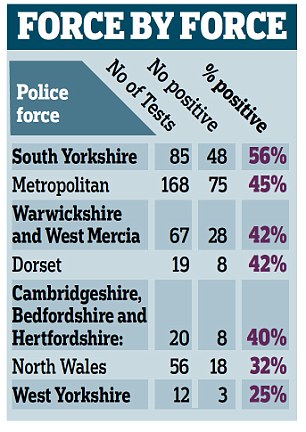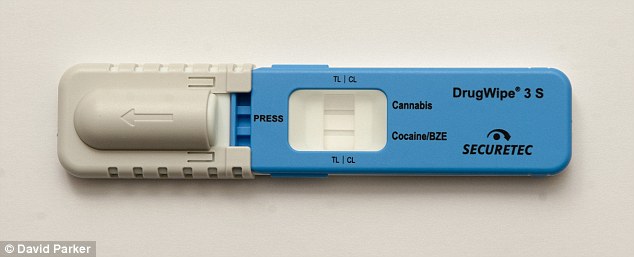- Joined
- Jan 23, 2013
- Messages
- 30,607
Hidden menace of the drivers high on drugs: Six out of ten motorists are failing new roadside tests
By RAY MASSEY and TOM PAYNE FOR THE DAILY MAIL
24 May 2015

New roadside ‘drugalyser’ tests have revealed a hidden epidemic of drug-driving across Britain.
Police forces are recording positive results for as many as 56 per cent of suspects who are pulled over, figures uncovered by the Daily Mail show.
The new testing kits – similar to the breathalyzers used to catch drink drivers – were introduced in March in the wake of legislation to crack down on motorists who get behind the wheel after taking drugs.
They enable police to instantly detect cannabis and cocaine at the roadside. Eventually it is hoped the tests will be able to recognise 14 other drugs, both legal and illegal.
But police forces are already recording alarmingly high hit rates – with most forces saying around 50 per cent of motorists they pull over are testing positive.
The figures suggest many people have been driving after taking drugs because they are convinced they can get away with it.
Transport Secretary Patrick McLoughlin last night said the findings, obtained by a survey of police forces, vindicated the push to make drug-driving as socially unacceptable as drink-driving.
He said: ‘I want to remove dangerous drivers from our roads, including those who think it’s acceptable to drive under the influence of drugs. The law has made it easier for police to secure convictions and will help save lives.’
The new law came in on March 2, and sets permissible limits at very low levels – bordering on ‘zero tolerance’ – for eight illegal drugs such as cannabis, cocaine and ecstasy.
It also covers eight prescription drugs, typically used for insomnia or anxiety, with limits exceeding normal prescribed doses. Roadside drugalysers can detect cannabis or cocaine in the saliva, but laboratory testing is needed for other banned substances.
Motorists convicted of drug-driving face a minimum of a year’s ban, a hefty fine and up to six months in prison.
Cannabis is by far the most common drug being detected, accounting for around 80 per cent of the positive results, according to the Department for Transport. Overall, the highest hit rate has been in South Yorkshire where 48 out of 85 roadside tests proved positive.

continued here http://www.dailymail.co.uk/news/art...ten-motorists-failing-new-roadside-tests.html
By RAY MASSEY and TOM PAYNE FOR THE DAILY MAIL
24 May 2015

New roadside ‘drugalyser’ tests have revealed a hidden epidemic of drug-driving across Britain.
Police forces are recording positive results for as many as 56 per cent of suspects who are pulled over, figures uncovered by the Daily Mail show.
The new testing kits – similar to the breathalyzers used to catch drink drivers – were introduced in March in the wake of legislation to crack down on motorists who get behind the wheel after taking drugs.
They enable police to instantly detect cannabis and cocaine at the roadside. Eventually it is hoped the tests will be able to recognise 14 other drugs, both legal and illegal.
But police forces are already recording alarmingly high hit rates – with most forces saying around 50 per cent of motorists they pull over are testing positive.
The figures suggest many people have been driving after taking drugs because they are convinced they can get away with it.
Transport Secretary Patrick McLoughlin last night said the findings, obtained by a survey of police forces, vindicated the push to make drug-driving as socially unacceptable as drink-driving.
He said: ‘I want to remove dangerous drivers from our roads, including those who think it’s acceptable to drive under the influence of drugs. The law has made it easier for police to secure convictions and will help save lives.’
The new law came in on March 2, and sets permissible limits at very low levels – bordering on ‘zero tolerance’ – for eight illegal drugs such as cannabis, cocaine and ecstasy.
It also covers eight prescription drugs, typically used for insomnia or anxiety, with limits exceeding normal prescribed doses. Roadside drugalysers can detect cannabis or cocaine in the saliva, but laboratory testing is needed for other banned substances.
Motorists convicted of drug-driving face a minimum of a year’s ban, a hefty fine and up to six months in prison.
Cannabis is by far the most common drug being detected, accounting for around 80 per cent of the positive results, according to the Department for Transport. Overall, the highest hit rate has been in South Yorkshire where 48 out of 85 roadside tests proved positive.

continued here http://www.dailymail.co.uk/news/art...ten-motorists-failing-new-roadside-tests.html
